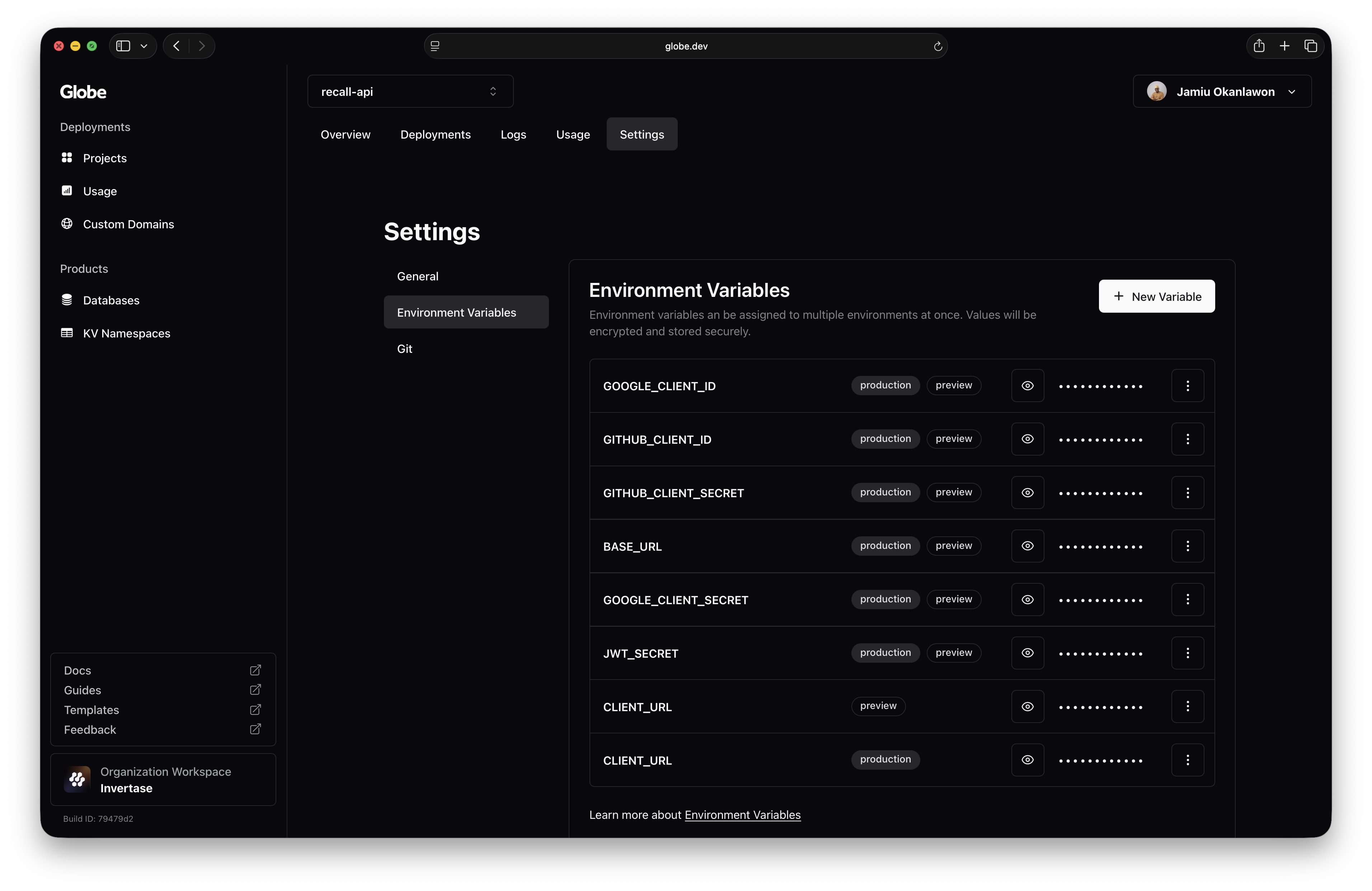Environment Variables
Manage secrets and environment-specific configuration for your Globe deployments using environment variables, with support for preview and production environments.
Environment variables let you manage secrets and environment-specific configuration without hardcoding values in your app. Use them to store API keys, database URLs, and other sensitive or environment-specific settings securely.
Why Use Environment Variables?
Environment variables help you:
- Keep secrets like API keys, tokens, or credentials out of your source code
- Customize behavior for different deployment environments (e.g., development, staging, production)
- Collaborate securely with teams across versions and environments
- Automate deploys without hardcoding sensitive values
Store sensitive values in environment variables, not in source code or comments.
How to Create Environment Variables
- In the Globe dashboard, go to your project
- Open Settings → Environment Variables
- Select Add Variable
- Enter a name and value
- Choose environments:
preview,production, or both - Select Save

All values are encrypted at rest and can only be viewed directly through the dashboard. You’ll need to redeploy your project for changes to environment variables to take effect.
Using Dart’s Platform.environment map
import 'dart:io';
void main() {
final apiKey = Platform.environment['API_KEY'];
if (apiKey != null) {
print('API Key: $apiKey');
} else {
print('API Key not found!');
}
}
Using the dotenv Package
In development, use a .env file locally and the dotenv package to load environment variables while still respecting platform variables in deployment.
import 'package:dotenv/dotenv.dart';
void main() {
final env = DotEnv(includePlatformEnvironment: true)..load();
final apiKey = env['API_KEY'];
print('API Key: $apiKey');
}
Static files like .env are ignored during deployment. Always pass
includePlatformEnvironment: true to ensure your deployed app can access your
defined environment variables.
How to Use Environment Variables with Flutter Web
Flutter Web requires build-time variables via the --dart-define flag, as runtime access with Platform.environment is unavailable.
Globe automates this process for the Flutter preset. The build system reads all project Environment Variables for a deployment and appends them as --dart-define=VARIABLE_NAME=value flags to the flutter build web command.
How to Access Variables in Flutter Web
You can then access these compiled-in variables in your Dart code using String.fromEnvironment:
class AppConfig {
static const supabaseUrl = String.fromEnvironment('SUPABASE_URL');
static const supabaseAnonKey = String.fromEnvironment('SUPABASE_ANON_KEY');
}
Globe’s System Environment Variables
Globe automatically provides these system environment variables in all deployments:
| Name | Description |
|---|---|
PORT | The port your application should listen on |
GLOBE | Set to '1' to indicate app running in Globe |
GLOBE_BUILD_ENV | Set to '1' when code is running in Globe Build Environment |
HOSTNAME | The hostname of your deployed application |
CRON_NAME | Name of the cron job from globe.yaml file |
CRON_SCHEDULE | The cron schedule pattern (e.g., * * * * *) |
CRON_ID | Unique identifier for the defined cron job |
CRON_EVENT_ID | Unique identifier for the current running cron instance |
Cron environment variables are only available when a cron job is running.
Detecting Globe Environment
Use the GLOBE variable to check if your application is running in Globe:
import 'dart:io';
void main() {
final isGlobe = Platform.environment['GLOBE'] == '1';
if (isGlobe) {
// Running in Globe - use production configuration
print('Running in Globe environment');
} else {
// Running locally - use development configuration
print('Running in local environment');
}
}
Using GLOBE_BUILD_ENV for Pre-Deployment Tasks
The GLOBE_BUILD_ENV variable allows you to run migrations and other pre-deployment checks during the build phase, before your application starts serving traffic. This helps avoid slow startup times at runtime.
import 'dart:io';
void main() async {
final isBuildEnv = Platform.environment['GLOBE_BUILD_ENV'] == '1';
if (isBuildEnv) {
stdout.writeln('Running in build environment, setting up DB.');
// Run database migrations
await migrations.migrate(db);
// Perform other pre-deployment setup
}
// Your application code continues here
}
Running migrations and setup tasks during build time rather than at runtime helps improve application startup speed.
Important Considerations
- Environment-Specific Variables: Configure variables to appear only in specific environments (preview, production, or both)
- Redeployment Required: After adding, changing, or removing variables, redeploy your project for changes to take effect
- Encrypted Storage: All variable values are encrypted at rest and in transit
- No Version History: Globe doesn't maintain history of variable values; document important changes
Best Practices
- Use descriptive variable names like
STRIPE_SECRET_KEY,FIREBASE_API_KEY, orDB_URL - Never commit sensitive values to your code repository; even in comments
- Regularly review and rotate sensitive values like API keys
- Use different values for preview and production environments when appropriate
- Document required variables in your project’s README
Related Topics
- Domains - Connect custom domains to your deployments
- Build Settings - Configure how your app is built and deployed
- Deployments - Understand preview and production deployments
